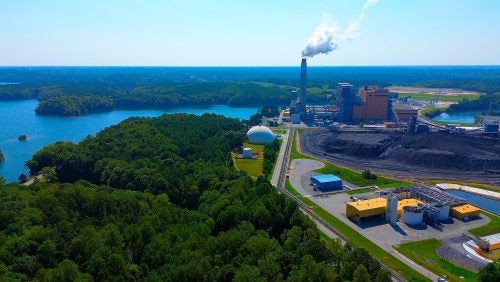With a New Executive Order, the Trump Administration Takes Aim at State Climate Legislation
May 6, 2025 by Christopher Slama

With the aim of promoting coal-fueled power generation, Executive Order 14260 instructs the Attorney General to target state “climate superfund” legislation.
A challenge to state climate laws by the Department of Justice, following a recent executive order, will test the limits of environmental federalism. But the dormant Commerce Clause is not a serious obstacle for states.
On April 8th, 2025, President Trump issued an executive order title “Protecting American Energy from State Overreach,” directing the Attorney General to take “all appropriate action to stop the enforcement” of state laws “burdening the identification, development, siting, production, or use of domestic energy resources that are or may be unconstitutional, preempted by federal law, or otherwise unenforceable.”[1] This directive came as part of a package of executive orders touted to restore American “energy dominance” by promoting coal mining and power generation, rolling back Biden-era administrative guidance, lifting regulatory barriers to coal mining, and granting emissions standards exemptions to coal-fired power plants.[2]
Executive Order 14260 gives more than a hint about the particular laws the administration considers “unconstitutional, preempted . . . or otherwise unenforceable.” In addition to California’s emissions cap-and-trade program, the order singles out (unmistakably, though without directly naming) New York and Vermont’s “climate superfund” laws. These laws require fossil fuel companies to pay for climate-change related damages and adaptation costs.[3] New York’s law, which resembles similar legislative efforts in other states,[4] is undeniably legally ambitious. It allows the state to levy fines against large fossil fuel companies for their contributions to past emissions, collectively amounting to $3 billion per year, to pay into a “climate recovery fund” created to redress harm from severe weather events.[5]
In February, a coalition of states and fossil fuel companies filed a lawsuit challenging the New York law.[6] While the exact scope of the “appropriate action” the DOJ will decide to take under Executive Order 14260 remains unknown, it appears certain that the federal government will seek to join in this lawsuit or file related suits of its own.
The Order foreshadows the legal arguments the DOJ may be expected to make in contesting these laws. Among these, the administration accuses state climate change laws like New York’s of “target[ing] or discriminat[ing] against out-of-state energy producers” and argues that the laws “undermine federalism by projecting the regulatory preferences of a few states into all states.”[7] This is a reference to the “Dormant Commerce Clause,” the judicially-created doctrine which states that forms of state laws—particularly those that “discriminate” against out-of-state producers or markets with an economic protectionist purpose—are federally preempted by default, even in the face of Congressional silence.[8] In light of the Supreme Court’s recent decision in National Pork Producers Council v. Ross,[9] however, such a challenge will not be easy for the government to make. That case upheld a Rule 12(b)(6) dismissal of a Dormant Commerce challenge to California’s Proposition 12, which was functionally an animal welfare law primarily affecting pork growers outside California.[10] The justices unanimously rejected the argument that a state law which has the “practical effect of controlling commerce outside the state” necessarily violates the Dormant Commerce Clause, and recentered the doctrine’s balancing test around economic protectionism.[11] In doing so, the a majority of justices affirmed an earlier case holding that laws with disproportionate out-of-state impacts are not therefore discriminatory against out-of-state commerce.[12]
In light of these cases, the administration’s proposed reliance on Dormant Commerce Clause arguments to invalidate state climate laws is legally tenuous. Whatever merit there may be to the arguments suggested by the text of the order, including preemption by the Clean Air Act and the “excessive fines” clause of the 8th Amendment, state climate laws that burden out-of-state fossil fuel companies to address in-state environmental harms do not overreach the legitimate sphere of the state’s police powers under the Dormant Commerce Clause. Yet, as the administration continues an aggressive push against states that continue to experiment with bold strategies to address climate harms, the limits of constitutional federalism will again be tested in the courts.
[1] Executive Order No. 14,260, 90 Fed. Reg. 15513, 15514 (Apr. 8, 2025).
[2] See Marc Levy, Trump’s new energy order puts states’ climate laws in the crosshairs of the Department of Justice, Associated Press: U.S. News (Apr. 10, 2025), https://apnews.com/article/trump-climate-ai-data-energy-fossil-fuel-243008a52381e5861f845c038f01f1b8.
[3] See Governor Hochul Signs Landmark Legislation Creating New Climate Superfund, Governor Katy Hochul: New York State (Dec. 26, 2024), https://www.governor.ny.gov/news/governor-hochul-signs-landmark-legislation-creating-new-climate-superfund.
[4] See Martin Lockman and Emma Shumway, State “Climate Superfund Bills: What You Need to Know, Climate Law: A Sabin Center Blog (Mar. 14, 2024), https://blogs.law.columbia.edu/climatechange/2024/03/14/state-climate-superfund-bills-what-you-need-to-know/ (noting that Maryland and Massachusetts were considering similar legislation).
[5] 22 States Sue to Block New York Law Targeting Fossil Fuel Companies, N.Y. Times (Feb. 6, 2025), https://www.nytimes.com/2025/02/06/nyregion/climate-change-superfund-act-lawsuit.html.
[6] Id.
[7] 90 Fed. Reg. at 15513.
[8] See, e.g., Brannon P. Denning, Reconstructing the Dormant Commerce Clause Doctrine, 50 Wm. & Mary L. Rev. 417, 421–22 (2008).
[9] Nat’l Pork Producers Council v. Ross, 598 U.S. 356 (2023).
[10] See id. at 363–68.
[11] Nat’l Pork Producers, 598 U.S. at 371–72 (Gorsuch, J. for the Court) (internal quotation marks omitted); id. at 394 (Roberts, C.J., concurring in part and dissenting in part) (“I also agree with the Court’s conclusion that our precedent does not support a per se rule against state laws with ‘extraterritorial’ effects.”).
[12] See National Pork Producers at 383–85 (opinion of Gorsuch, J.); 401–02 (Roberts, C.J. concurring in part and dissenting in part) for the justices’ discussion of Exxon Corp. v. Governor of Maryland, 437 U.S. 117 (1978), which held that a Maryland law forcing the sale of refiner-owned gas stations to combat anticompetitive vertical integration in the fuel industry was not discriminatory against out-of-state refineries even though the targeted companies were based out of state.

